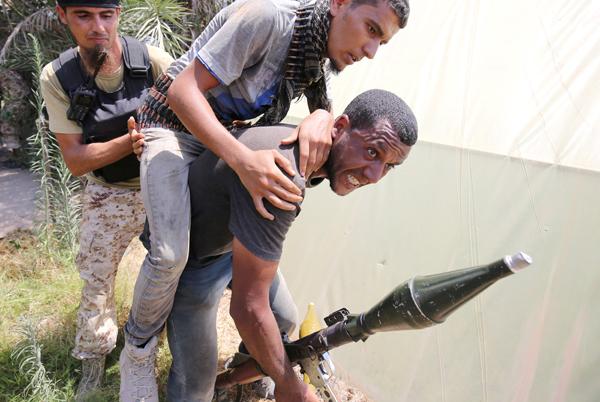You are here
Jordan calls for activating legitimate Libya institutions
By Agencies - May 17,2016 - Last updated at May 17,2016
VIENNA — Jordan on Monday reaffirmed its backing of the Libyan Presidency Council and efforts to round up and build institutions listed in the UN-sponsored Skhirat Agreement to restore security and repel terror groups, especially Daesh.
In remarks at an international meeting in Vienna to push for stability in Libya, Deputy Prime Minister and Foreign Minister Nasser Judeh said the success in mobilising these institutions is the only hope left for Libya to restore stability and security, preserve its territorial unity and defeat terrorism, the Jordan News Agency, Petra, reported.
He stressed that terrorism is number one threat to the future of Libya and the security of its people and the region, urging participants to come up with a unified stand in support of the embattled presidential council.
He also urged reconciliation between the presidential council, the national accord government and the national army, which, he said, should function under the council. Such a concord would expand the base of supporters for the new rule in Libya and take the country closer to consensus.
He said stakeholders should heed warnings by international leaders highlighting the possibility of networking between Daesh and Nigeria-based Boko Haram.
Representatives of major powers, including the US discussed in the Vienna meeting the growing threat posed by Daesh in conflict-wracked Libya, Agence France Presse reported.
Daesh has taken advantage of the chaos left by the toppling and death of Muammar Qadhafi in 2011, which left rival militias vying for control of the oil-rich country.
A recently formed unity government backed by the international community has been slowly asserting its authority in Tripoli, but it still faces a rival administration in the east, AFP reported.
In a bid to stabilise the country, the fledgling regime of Prime Minister Fayez Al Sarraj has drawn up a list of requests for Western partners to assist its forces with arms, training and intelligence.
The Vienna conference was co-chaired by the US and Italy, Libya’s former colonial ruler that has faced a major influx of migrants from the North African nation braving the perilous sea voyage, according to AFP.
A total of 25 top diplomats attended the conference, including the UN’s Special Envoy to Libya Martin Kobler and EU foreign policy chief Federica Mogherini.
“The key question is whether Libya remains a place where terrorism, people-smuggling and instability continue to flourish or whether we can regain statehood with the new unity government,” AFP quoted German Foreign Minister Frank-Walter Steinmeier as saying.
“We have a lot to do,” US State Secretary John Kerry told reporters before he held brief talks with Sarraj at Vienna’s Bristol Hotel.
The Libyan leader has insisted his country needed assistance, not intervention.
“We are not asking for foreign boots on the ground, but we are requesting assistance with training, and lifting the arms embargo on Libya,” Sarraj wrote in a column published in the British newspaper The Telegraph on Monday, cited by AFP.
Formed in late March, his Government of National Accord (GNA) has won international support as well as backing from key institutions like the central bank and the National Oil Corporation.
But it has failed to get the endorsement of the elected parliament and its ally Khalifa Haftar, a self-declared army chief who has launched a crusade against Islamist fighters across the country.
A rival government in the eastern city of Tobruk has also refused to recognise the GNA.
Amid the chaos, Daesh has carved itself a bastion in Libya where it overran last year the Mediterranean coastal city of Sirte, Qadhafi’s hometown, transforming it into a training camp for militants.
Europe fears the militants, who have in recent weeks made new advances, will use Sirte’s port and airport as a springboard to launch attacks on the continent.
Daesh “is a threat not only to Libyans and the wider region, but also to Europe”, warned French Foreign Minister Harlem Desir at the start of the conference.
“We are calling on Libyan political powers to form an alliance with Sarraj and create the necessary institutions to combat [Daesh].”
On the sidelines of the meeting, Judeh discussed developments in Syria and Libya and reviving Palestinian-Israeli peace negotiations with US Secretary of State John Kerry.
Judeh also met separately with his Egyptian counterpart Sameh Shukri and they discussed the condition in Libya and Syria, in addition to bilateral relations.
Related Articles
TRIPOLI — On March 30, Libya’s prime minister-designate Fayez Al Sarraj sailed into Tripoli under naval escort and set up the headquarters o
TRIPOLI — US warplanes Monday carried out air strikes on positions of the Daesh terror group in the Libyan city of Sirte for the first time,
TRIPOLI — Libyan forces said Tuesday they were advancing inside the extremist bastion of Sirte, as Washington conducted a second straight da












